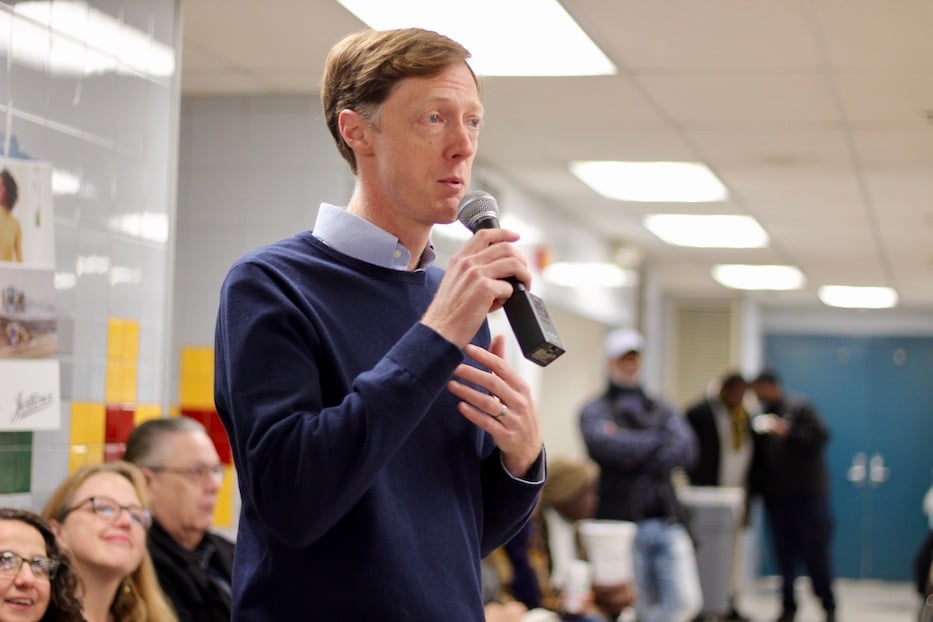
Radio & Audio | Arts, Culture & Community | Mayoral Campaign 2019

| Mayor-elect Justin Elicker speaks at the first of two Transition Team public input meetings at High School in the Community. Lucy Gellman Photo. |
First there were the Facebook posts. Then there was a foray into Instagram. Now, Mayor-elect Justin Elicker has hopped into podcasting as an attempt to connect with more New Haveners.
Elicker has entered the audio realm with “What Is A Transition Team?” a podcast that dropped its first installment Monday night. With audio recorded between Elicker’s East Rock home and his first public input meeting at High School in the Community on Nov. 23, it offers an overview of what the transition team’s work has looked like up to this point, what members plan to accomplish in the coming month, and what the first stages of an Elicker administration may look like in the longer term.
It is produced by Casey Pickett, director of the Yale Carbon Charge, as well as by Gateway Community College students Samantha Schroeder and Caitlyn Kelley and Yale student Akhil Rajan. Schroeder and Kelley are both studying communications; Rajan is a student in political science and human rights studies. The first episode is available for streaming via Soundcloud.
“I’m thinking of just trying out a lot of different ways to communicate with people,” said Elicker in a phone call Tuesday morning, adding that he thinks of podcasts as particularly personal. “This is just one tool that we can use. One thing that I’ve personally enjoyed about a podcast is that you can listen to it while you’re doing something else ... it’s another way to give people an opportunity to know what’s going on.”
In the first episode, Elicker plays listeners in with a sort of steady, plodding guitar, introducing himself as he and Pickett pick up the conversation in his living room. It’s homespun and folksy but also straightforward: Elicker jumps right into the work the team has been doing, including a newly-christened office in City Hall. There’s some endearing fiddling with the handheld recorder, for which a child’s small sock serves as a temporary sound shield. Elicker jokes that he’s spent the day settling into the new office, attending a union rally, and washing dishes. The subtext is that he's flexible enough to do all three.
But he also cuts to the political chase, recalling his time door knocking during his campaign before addressing the work the team has cut out for itself in the next month and in the first months of the administration. In what has become a frequent refrain, he talks about not having the answers and praises members of the team.
“People feel like they’re not listened to, and city hall can do so much more to just listen” he says at one point. “Not just during this process, but all along the way. We want people to have a lot of opportunities for public comment, suggestions and input.”
It’s also a strategic move in a campaign that has leaned heavily—and successfully, one might argue—on social media and digital distribution. In some ways, Elicker didn’t begin his 2019 run for mayor with an announcement: he started it when he snapped a photo of a primary ballot in August 2018, ending a two-year social media hiatus to show people that he’d voted for Eva Bermúdez Zimmerman.
Before press conferences ever materialized, there were posts documenting his visits to immigrant rights groups, community management team meetings, and rallies across the city. Rarely did he appear in these images; they centered the community instead. When he declared his intent to run in January of this year, he stepped into the frame on Facebook and Instagram with other door-knockers, petition-signers, and supporters. The podcast feels like an extension of that: declaring an intent to lead in the context of grassroots community.
It’s made more effective as Pickett mixes in audio from the community, collected at the first community input meeting in late November. Seth Poole, who ran as a write-in candidate, pushes for greater transparency and information. High schooler Kassandra Martel advocates for stronger LGBTQ+ rights in schools, and getting Immigrations and Customs Enforcement officially out of New Haven. A mom who is a clinical therapist reminds Pickett that not all Black boys have Attention Deficit Disorder, and not all of them have experienced trauma.
“It's a blast to be working with Justin on this project,” Pickett wrote by email Tuesday. “And the students are smart and delightful. We hope this is a way to enable New Haven to talk with itself; and for Justin and the Transition Team to hear from and speak with people in a medium that's convenient and accessible for residents.”
To listen to the podcast, click on the link below.

